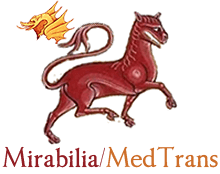
-Index-
New lights on research about Arab-Islamic Culture in the Muslim West along Classical epoch. Presentation
Francisco FRANCO-SÁNCHEZ, Antonio CONSTÁN-NAVA
The Sufi thought in the Rasā’il Iḫwān al-Ṣafā’
Mourad KACIMI
Original title: El pensamiento sufí en las Rasā’il Iḫwān al-Ṣafā’
In this article we highlight the basic fundaments of Sufi discipline in religion and philosophy. Similarly, is shown how was employed this type of knowledge and conceptions in a book as the Encyclopedia of Iḫwān al-Safā’, classed inside the philosophical genre. On the other hand, we emphasize the significance and influence of the philosophical ideas of the Iḫwān al-Safā’ in later prominent Sufi scholars.
The influence of Abū Ṭālib al-Makkī’s (d. 386 H./996 C.e.) Qūt al-qulūb and al-Sulamī’s (d. 412 H./1021 C.e.) Ṭabaqāt al-ṣūfiyya in the development of sufi literature
Virginia VÁZQUEZ HERNÁNDEZ
Original title: La influencia de Qūt al-qulūb de Abū Ṭālib al-Makkī (m. 386 H. /996 e.C.) y Ṭabaqāt al-ṣūfiyya de al-Sulamī (m. 412 H. /1021 e.C.) en el desarrollo de la literatura sufí
Qūt al-qulūb de Abū Ṭālib al-Makkī (m. 386 H./996 e.C.) y Ṭabaqāt al-ṣūfiyya de al-Sulamī (m. 412 H./1021 e.C) son dos obras sufíes que se compusieron en el periodo de transición del ascetismo al misticismo. Tanto sus doctrinas como el modo en que se redactaron influyeron en autores y obras posteriores. Basándome en un programa desarrollado por el proyecto KITAB, analizaré el papel que jugaron ambas obras en el desarrollo de esta literatura en el Oriente y el Occidente islámico.
A summary of the necessary virtues to the applicant in the mystical path: al-‘Awāṣim qawāṭi‘ al-qawāṣim of Ibn Sab‘īn (Ricote, Murcia, 13th. c.)
Carlos BERBIL
Original title: Un resumen de las virtudes necesarias para el aspirante en la vía mística: al-‘Awāṣim qawāṭi‘ al-qawāṣim, de Ibn Sab‘īn (Ricote, Murcia, s. XIII)
This article presents a preliminary study of a brief unpublished work by Ibn Sabʿīn. The author offers a summary of the "saviour practices", which are here related to "citadels" (ʿawāṣim), that can help the disciples in the spiritual path to stay away from misfortunes (qawāṣim).
Knowledge according to sufi thought
Naser Mohamed HRAGA
Original title: El saber según en el pensamiento sufí
In this work we study knowledge in Sufism. It is the importance of knowledge, analyzing ideas such as the nature of this truth and the degrees of Sufi knowledge. Sufi knowledge is a difficult subject to explain, among other reasons because this theory is a personal experience, and because knowledge allows you to contemplate all the mysterious truths about the divine to the Sufi. The texts of al-Ġazālī, Ibn ‘Arabī, and the mystic poet Farīd al-Dīn al-‘Aṭṭār are provided.
Valencian spoken loanwords in trilingual documentation of the Moriscos of Llombai (Valence, 16th century)
Antonio CONSTÁN-NAVA
Original title: Préstamos del valenciano hablado en documentación trilingüe de Llombai (Valencia, siglo XVI)
The present paper highlights the linguistic contact of the Moriscos’ aljama of Llombai (Valence, s. XVI) with the dominant romance language of their neighbourhood and epoch. Are presented accounting texts loaded with linguistic loans (in this occasion, valencian terms written in Arabic characters). The manuscripts serve to open another field of research on the linguistic, social and economic realities of the Morisco community of the Marquisate of Llombai.
Arabic words in the notarial protocols from Granada of the 16th. century. Approach to the Moriscos material culture through the documentation
Nuria FOLLANA FERRÁNDEZ
Original title: Palabras árabes en los protocolos notariales granadinos del siglo XVI. Aproximación a la cultura material de los moriscos a través de la documentación
This article is an approximation to the results of the doctoral thesis entitled “The Hispanic-Muslim material culture in the time of the Catholic Kings: the example of the Kingdom of Granada”. As a sketch of the conclussions of the research is showed several results related to elements of clothing and the so-called “'household clothes”.
Translating religious enemy’s animus: Problems translating Tirant lo Blanc into Arabic
Hany El ERIAN EL BASSAL
Original title: Traduciendo la animadversión religiosa del enemigo: Problemas para la traducción al árabe del Tirant lo Blanc
First of all, this article is about the novel and its authorship. We are dealing with the translating difficulties with regard to these two heterogeneous cultures. We are presenting how difficult Tirant’s translation is referred to Islam, as well as the words ‘Moor’ when having to translate them into Arabic, taking as a reference Don Quixote of La Mancha translations into Arabic.


















































































